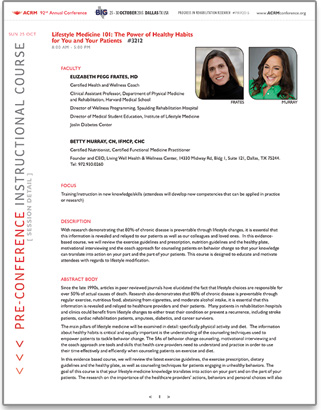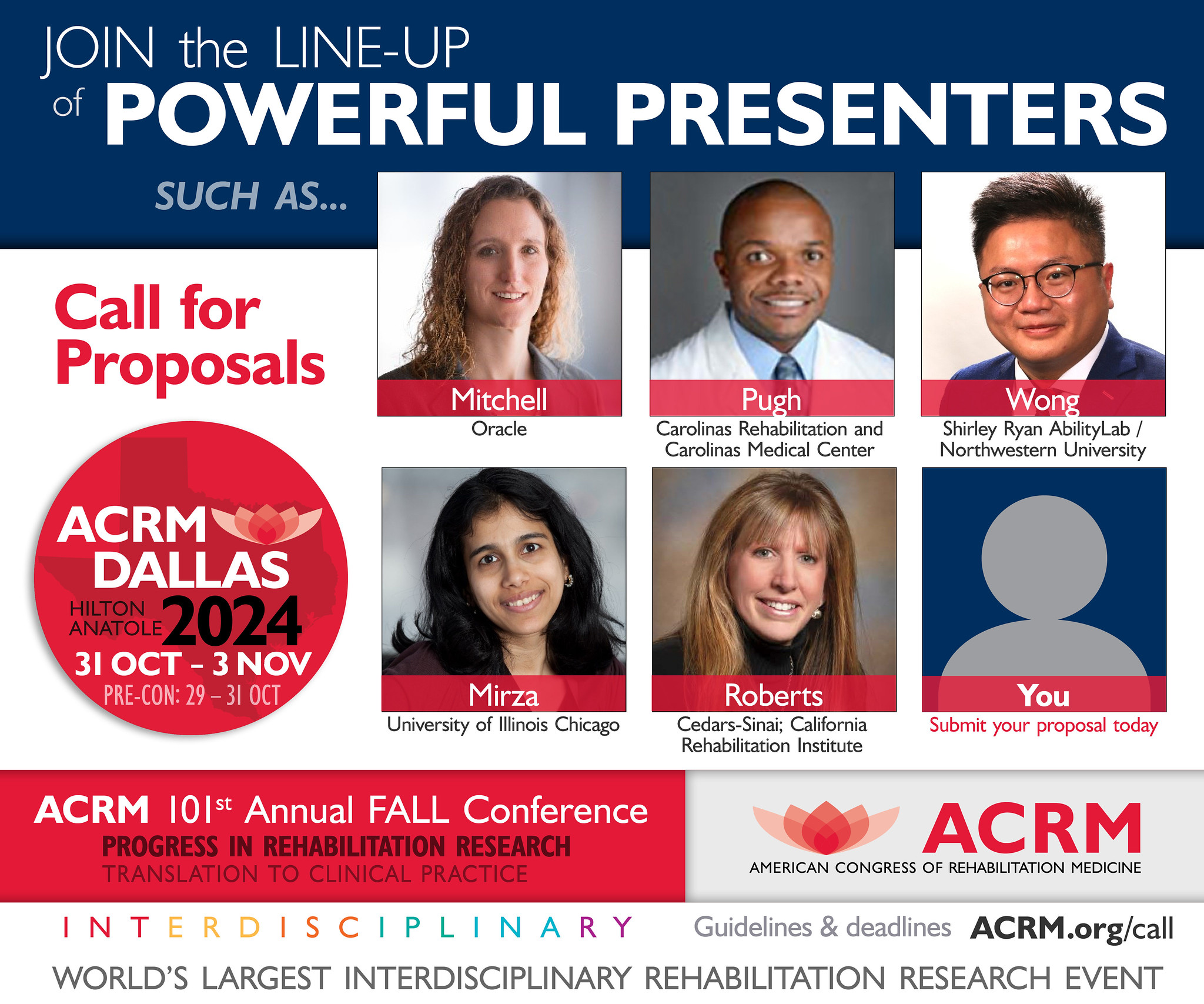INSTRUCTIONAL COURSE DETAIL
SUN, 25 OCT: 8:00 AM – 5:00 PM
PRESENTERS
Elizabeth Pegg Frates, MD and Certified Health and Wellness Coach
Clinical Assistant Professor, Department of Physical Medicine and Rehabilitation, Harvard Medical School
Director of Wellness Programming, Spaulding Rehabilitation Hospital
Director of Medical Student Education, Institute of Lifestyle Medicine
Joslin Diabetes Center
Betty Murray, CN, IFMCP, CHC
Certified Nutritionist, Certified Functional Medicine Practitioner
Founder and CEO, Living Well Health & Wellness Center, 14330 Midway Rd, Bldg 1, Suite 121, Dallas, TX 75244. Tel: 972.930.0260
DIAGNOSIS
Stroke, Other: cardiovascular disease, diabetes (amputee), obesity, metabolic syndrome
FOCUS
Clinical Practice; (assessment, diagnosis, treatment, knowledge translation/EBP)
In-depth information communication/knowledge translation (course is intended primarily to impart information)
DESCRIPTION
With research demonstrating that 80% of chronic disease is preventable through lifestyle changes, it is essential that this information is revealed and relayed to our patients as well as our colleagues and loved ones. In this evidence based course, we will review the exercise guidelines and prescription, nutrition guidelines and the healthy plate, motivational interviewing and the coach approach for counseling patients on behavior change so that your knowledge can translate into action on your part and the part of your patients. This course is designed to educate and motivate attendees with regards to lifestyle modification.
ABSTRACT BODY
Since the late 1990s, articles in peer reviewed journals have elucidated the fact that lifestyle choices are responsible for over 50% of actual causes of death. Research also demonstrates that 80% of chronic disease is preventable through regular exercise, nutritious food, abstaining from cigarettes, and moderate alcohol intake, it is essential that this information is revealed and relayed to healthcare providers and their patients. Many patients in rehabilitation hospitals and clinics could benefit from lifestyle changes to either treat their condition or prevent a recurrence, including stroke patients, cardiac rehabilitation patients, amputees, diabetics, and cancer survivors.
The main pillars of lifestyle medicine will be examined in detail: specifically physical activity and diet. The information about healthy habits is critical and equally important is the understanding of the counseling techniques used to empower patients to tackle behavior change. The 5As of behavior change counseling, motivational interviewing and the coach approach are tools and skills that health care providers need to understand and practice in order to use their time effectively and efficiently when counseling patients on exercise and diet.
In this evidence based course, we will review the latest exercise guidelines, the exercise prescription, dietary guidelines and the healthy plate, as well as counseling techniques for patients engaging in unhealthy behaviors. The goal of this course is that your lifestyle medicine knowledge translates into action on your part and on the part of your patients. The research on the importance of the healthcare providers’ actions, behaviors and personal choices will also be reviewed. The benefits of exercise and a healty diet as well as the risks of sedentary behavior and poor dietary choices will also be examined. This course is designed to educate and motivate attendees with regards to lifestyle modification.
LEARNING OBJECTIVES
- Describe the importance of lifestyle medicine in the rehabilitation hospital or clinic
- Describe the exercise prescription
- List the components of a healthy diet
- Identify the difference between the expert approach and the coach approach in behavior change counseling
- Recognize the importance of the healthcare providers\’ personal lifestyle choices
Course Outline
- Introduction to Lifestyle Medicine-An Overview: Dr. Elizabeth Frates, 1 hour, a tour through the history of lifestyle medicine, citing the landmark studies and the most recent research in lifestyle medicine. Recognizing the value of lifestyle medicine interventions for the treatment and prevention of chronic diseases such as cardiac disease, stroke, diabetes, hypertension, metabolic syndrome, and obesity.
- Exercise Guidelines and Risk Stratification System: Dr. Elizabeth Frates, 1 hour, using the United Stated Health and Human Services Guidelines, identify how many minutes of physical activity are recommended per week and where that number came from by examining the Physical Activity Guidelines for Americans document, discuss aerobic activity and strength training, review the American College of Sports Medicine Risk Stratification System to identify the risk associated with starting an exercise program.
- Exercise Prescription and Motivating your Patient to Move: Dr. Elizabeth Frates, 1 hour, discuss the four basic parts of the exercise prescription (frequency, intensity, time and type) and identify counseling techniques and strategies that motivate patients.
- Betty Murray: Dietary Guidelines: 1 hour, review the basics dietary guidelines and specific diets for specific conditions, determine the importance of certain macronutrients and micronutrients for treatment and prevention of disease.
- Dr. Frates and Betty Murray: Tools to Empower Patients to Adopt Healthy Eating Patterns: Speaker to be determined, 1 hour, identify tools (books, websites, apps) that support patients in their attempts to adopt a healthy diet, introduce the healthy plate, discuss portion control, review satiety factors
- The Importance of Social Connection and the Power of Positivity, Speaker to be determined, 1 hour: review the literature on social isolation, connection, and social networks, identify key research on positivity by Barbara Frederickson, Martin Seligman and others.
- Counseling Techniques that Empower Patients, Dr. Elizabeth Frates, 2 hours, Introduce the 5As of behavior change counseling, discuss motivational interviewing techniques and strategies, differentiate between the expert approach and the coach approach pointing to research on the coach approach, review the Transtheoretical Model of Change and its use with lifestyle modification.
BIO SKETCHES
Elizabeth Pegg Frates, MD
Dr. Elizabeth (Beth) Pegg Frates, is a physician as well as a certified health and wellness coach. She graduated magna cum laude from Harvard University, as a double major in psychology and biology. Then, she attended Stanford University Medical School where she chose the specialty of Physiatry. Dr. Frates came back to Boston for her internship in internal medicine at MGH and her residency at Spaulding Rehabilitation Hospital in the Harvard Department of Physical Medicine and Rehabilitation. There, she served as chief resident and President of the National Resident Physician Committee for the American Academy of Physical Medicine and Rehabilitation.
During her residency, she performed research on topics that launched her career trajectory on the topic of patient and care giver knowledge and expectations for functional recovery after stroke. The results are published in the American Journal of Physical Medicine and Rehabilitation in 2003. Finding there was a gap in patient and care giver knowledge, she co-authored a book to help fill this gap. The book is titled Life After Stroke: The Guide to Recovering Your Health and Preventing Another Stroke (2006) Johns Hopkins University Press. Also, in residency Dr. Frates participated in research surveying physicians on their personal exercise behavior and their exercise counseling behavior which was published in the Clinical Journal of Sports Medicine in 2000. This work revealed that physicians who exercise, counsel on exercise. This study continues to be cited and replicated, reinforcing the need to educate and motivate physicians to embrace exercise as medicine for themselves and their patients.
In 2008, Dr. Frates started her formal journey into lifestyle medicine at the Institute of Lifestyle Medicine at Harvard Medical School where she created a lifestyle medicine interest group for the Harvard Medical School, which continues to thrive and has been replicated in many institutions including Stanford. She serves at the Director of Medical Student Education at the ILM and for 7 years has been the co-director of the Harvard Medical School (HMS), CME Tools for Promoting Healthy Change and the assistant director of the HMS CME Active Lives. Dr. Frates is an award winning teacher at Harvard Medical School earning distinctions for her tutorial facilitation work in multiple courses taught to the first and second year students at HMS including the Central Nervous System, Musculoskeletal System, Endocrine System and Introduction to the Profession of Medicine. In the fall of 2014, she created and taught the first lifestyle medicine course at Harvard, Psych E 1037 Introduction to Lifestyle Medicine at the Harvard Extension School. This course received rave reviews with an evaluation of 4.9 out of 5 for the course overall and for her as an instructor. Dr. Frates is passionate about teaching.
Dr. Frates has trained in many different programs addressing behavior change in order to learn how to empower people to adopt healthy habits, those that prevent stroke and other lifestyle related diseases. This training includes a certification in Motivational Interviewing from UMass, certification in health and wellness coaching (having studied four different programs including the Diabetes Prevention Program Lifestyle Coach), Mind Body Medicine with Dr. Herb Benson’s group, and Mindfulness Based Stress Reduction with Dr. Jon Kabat-Zinn’s group. She has been actively involved with teaching evidence based wellness, healthy habits, stroke prevention as well as lifestyle medicine at the Harvard Medical School, Continuing Medical Education Conferences both nationally and internationally for years. Dr. Frates founded her own wellness coaching company, Wellness Synergy, LLC, in order to empower individuals and groups attain their optimal level of wellness. In fact, she piloted wellness groups for stroke survivors and their caregivers at Spaulding a couple of years ago. She has developed 12 Steps to Wellness, which has helped people move from sitting on the couch eating potato chips to walking and tracking their steps with pedometers and enjoying fruits and vegetables. In January 2015, she was offered the position of Director of Wellness Programming for the Stroke Institute at Spaulding Rehabilitation Hospital a Harvard Medical School Affiliate.
Betty Murray, CN, IFMCP, CHC
Betty Murray is a Certified Nutritionist in private practice. She received her Certified Functional Medicine Practitioner (IFMCP) designation from the Institute for Functional Medicine in 2014. In 2006, Betty is also the founder of Living Well Dallas, a medical practice management firm specializing in developing integrative multi-modality medical centers with two locations in the Dallas Metroplex. She is the Executive Director of the the Functional Medicine Association of North Texas a 501c6 non-profit educational organization promoting functional medicine education for allied health professionals in North Texas founded in 2011. In her private practice she focuses on assisting those with digestive disorders and autoimmunity to use nutrition and lifestyle changes to improve health outcomes. Betty is a member of the Institute for Functional Medicine and the National Association of Nutrition Professionals.
One full day of Instructional Courses $195 Three full days $395
WORLD PASS (from $595) is the best value if you attend just one instructional course and the CORE Conference. Pricing detail CLICK HERE![]()
*Although significant changes are not anticipated, all schedules, sessions, and presenters posted on this website are subject to change. Please consult the APP for the latest: ACRM.org/APP











